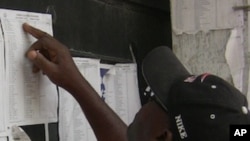Haiti is set to hold presidential elections on Sunday, amid concerns about how many people will actually cast ballots. Tens-of-thousands of Haitians who were displaced by the January earthquake are unsure if they will be allowed to cast ballots. And scores of Haitians living in the United States are watching the vote closely, even though the law bars them from voting.
Presidential campaigns are in full swing in Port-au-Prince. At this rally near the presidential palace, candidate Michel Martelly relies on humor to win supporters. Many in the crowd come from a nearby tent camp for those displaced by the January earthquake. Hundreds-of-thousands of people remain homeless.
Voter Elexcema Okinel says the tent camps are the country's Number One problem. "The first thing I want to see fixed is for the new government to move people from tents into real homes. There is so much misery in the tent camps," said Okinel.
Many in the tent camps are unsure if they will vote on Sunday. Some lost their identity cards in the quake. And others, like Ronnie Jean-Noel, are unsure what polling station to use. "I don't know where all of us are going to vote, but I am ready to vote," said Jean-Noel.
Political organizers rely on young Haitians to generate energy for their campaigns. This rally for Jude Celestine is a chance for many to dance and have fun. But some young people say the lack of post-quake progress has soured them on politics. Guerrier Accene says he has no plans to vote. "When the politicians need you, it is only to help them win an election and get into office," he said.
The challenges facing Haiti's next president are vast. The winner of the vote must improve conditions at home, but also satisfy the concerns of Haitians living in the United States. Several presidential candidates traveled to Florida for a debate earlier this month. Natalie Milias came to hear the candidates' proposals. "I am surprised to see a lot of people here. It never used to be like this before. I think, after the earthquake, we are more concerned now," she said.
Ron Blanchard says the event leaves him frustrated. "We are invited here, but I don't know exactly what our mandate is. We are just here to listen, we can't influence anything," he said.
Under Haitian law, the 800,000 Haitian nationals living in the United States are barred from voting. Blanchard says political candidates make appeals in the United States, not for votes, but for financial support. Last year, Haitian-Americans sent back nearly $2 billion to family in Haiti. "Financially, yes, we do send a great deal of money to Haiti. And, I think our support means a lot to both the country and the candidates themselves," said Blanchard.
Organizers held a mock vote for Haitian-Americans who attended the debate. They will have to wait for Sunday to see how the real election turns out.
Turnout Remains Big Question in Haiti Election








